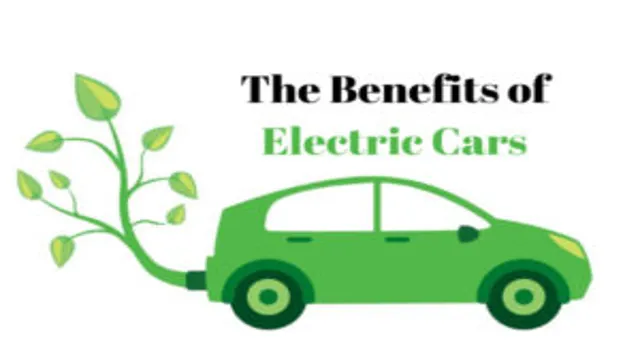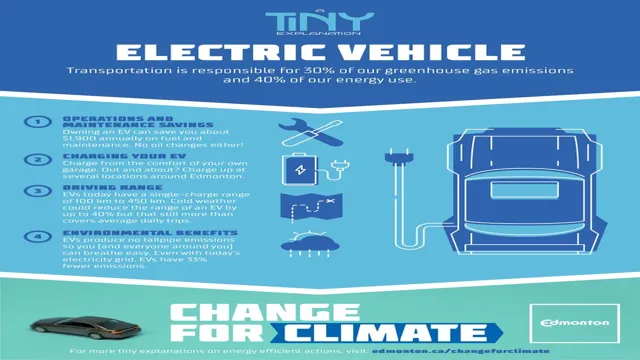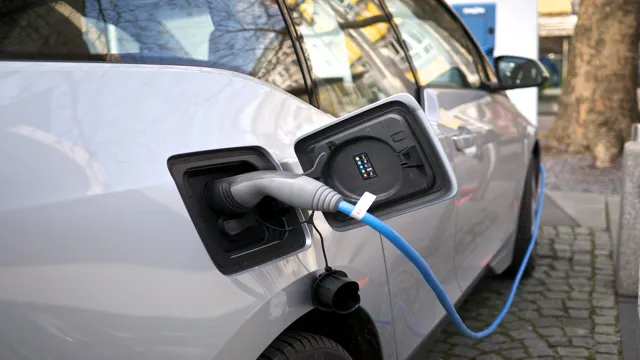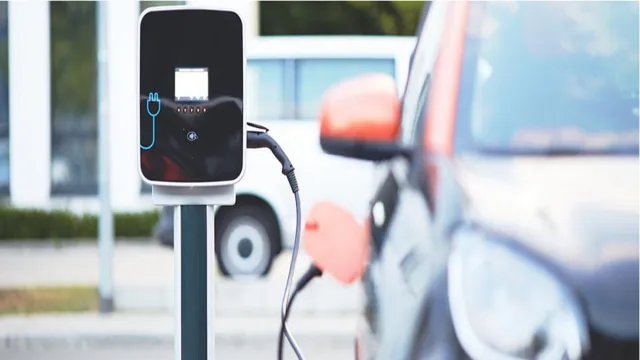Revolutionize the Way You Drive: Electric Cars for a Greener Planet!
Electric cars are taking over the roads and becoming increasingly popular among drivers. They offer numerous benefits for the environment, making them a more sustainable option compared to their gas-guzzling counterparts. But why are electric cars better for the environment? And what benefits do they bring? In this blog post, we’ll dive into the advantages of electric cars for the environment, from reducing carbon emissions to improving air quality in our cities.
So, buckle up and get ready to explore the world of electric cars and their positive impact on our planet.
Reduced Air Pollution from Emissions
One of the most significant electric car benefits for the environment is the reduced air pollution from emissions. Unlike conventional vehicles that run on internal combustion engines, electric cars don’t emit harmful pollutants like carbon dioxide, nitrogen oxide, and particulate matter. Such pollutants are known to be a leading cause of air pollution and have a severe impact on human health and the environment.
As electric cars run on electric motors that use energy stored in batteries, they produce zero tailpipe emissions. This not only helps to reduce air pollution in cities but also reduces the carbon footprint of transportation. In this way, the transition to electric cars can make a significant contribution to reducing greenhouse gas emissions and addressing climate change.
Electric cars emit less CO2 and pollutants than gas-powered cars
Electric cars are much better for the environment than traditional gas-powered cars. They emit significantly less CO2 and other pollutants, which greatly reduces air pollution. With the growing concern over climate change and air quality, electric cars have emerged as a viable solution to reduce greenhouse gas emissions and improve air quality.
In fact, studies have shown that electric cars have the potential to reduce CO2 emissions by up to 50% when compared to gas-powered cars. That’s because electric cars use electricity from the grid, which is cleaner than gasoline. Additionally, electric cars produce zero emissions while driving, which means they don’t contribute to local air pollution.
So, not only are electric cars better for the environment, but they also provide a better driving experience by reducing noise pollution and eliminating the need for frequent stops at the gas station.

Improves air quality and reduces health issues caused by pollution
Reduced Air Pollution from Emissions Air pollution is one of the biggest environmental concerns we face today. It’s a major problem in many cities around the world, and it can have serious health repercussions for those living in affected areas. Thanks to advancements in technology, modern-day vehicles are designed to produce less emissions, which contribute to air pollution.
This reduction in emissions has a significant impact on the air we breathe, leading to improved air quality and a reduction in health issues caused by pollution. As a result, more and more people are switching to clean energy vehicles, like electric cars, to reduce the amount of pollution they produce. This shift towards cleaner transportation has the potential to vastly improve the air quality in densely populated urban areas, thereby decreasing health issues caused by pollution such as asthma, lung diseases, and even cancer.
Keyword: Air Pollution
Reduced Noise Pollution
Electric cars have a multitude of benefits for the environment, and one of the most obvious is reduced noise pollution. Unlike traditional cars, electric vehicles operate more quietly and emit fewer decibels. This is a particularly important benefit in urban areas, where noise pollution can become a significant issue for residents and businesses alike.
With electric cars, drivers can enjoy a quieter, more peaceful driving experience, while also contributing to a healthier environment. Additionally, reduced noise pollution can have positive ripple effects, such as less stress and improved quality of life for those living in areas with heavy traffic. The use of electric cars can promote a more sustainable future, one where people can enjoy greater mobility without compromising their well-being or that of the planet.
Thus the switch to electric cars will have a positive impact on the environment and society as a whole.
Electric cars operate quietly and reduce noise pollution in urban areas
Electric cars offer a quiet and eco-friendly mode of transportation that reduces noise pollution in urban settings. The hustle and bustle of cities can be overwhelming, with the constant honking of horns, screeching of brakes, and revving of engines all contributing to noise pollution levels. Electric vehicles, on the other hand, operate nearly silently, helping to reduce noise levels and promote a more peaceful environment.
As an added bonus, this reduction in noise pollution can even lead to improved health outcomes for urban residents, as excessive noise levels have been linked to increased rates of stress and anxiety. Electric cars offer a practical solution to this issue, allowing us to move towards a more sustainable and harmonious way of living in urban areas. So, why not make the switch to an electric vehicle and help reduce noise pollution in your community?
Reduced Carbon Footprint
An electric car benefits the environment in numerous ways, but one of the most significant is by reducing the carbon footprint. A carbon footprint is the total amount of greenhouse gases, mainly carbon dioxide, produced by human activities such as transportation, energy usage, and even the food we eat. On the new-age roads, electric cars are taking center stage, and they emit zero emissions, thereby reducing the amount of carbon footprint.
In addition, since electric cars run on renewable energy sources such as solar or wind power, they offer a more sustainable, environmentally friendly alternative to conventional gasoline vehicles. By switching to electric cars, you become part of the solution to climate change and the urgent need to reduce greenhouse gas emissions. Furthermore, the demand for electricity to charge electric cars will also lead to greater investment in renewable energy sources, such as solar and wind power, which would further reduce the carbon footprint and protect the planet for future generations.
Ultimately, choosing an electric car is a smart choice for the environment, and by doing so, you can significantly reduce your carbon footprint, conserve natural resources, and help combat climate change.
Electricity generated from renewable sources reduces carbon footprint
Renewable energy is a great way to reduce carbon footprint and protect the environment. By generating electricity from renewable sources like solar, wind, or hydro power, we can significantly reduce the carbon emissions produced by traditional fossil fuel power plants. These sources of electricity are clean, green, and sustainable, meaning they do not deplete natural resources or harm the environment.
In fact, they help to preserve the planet for future generations and provide a pathway to a carbon-free future. The use of renewable energy reduces our dependence on nonrenewable fossil fuels, which are the primary cause of climate change and global warming. So, by opting for renewable sources of energy, we can cut down our carbon footprint while also saving money on energy bills.
The benefits of renewable energy are endless, and it’s high time we all switch to this eco-friendly solution and make a positive impact on our planet.
Decreases reliance on fossil fuels for transportation
Reduced Carbon Footprint Reducing our reliance on fossil fuels for transportation is paramount to mitigating the impacts of climate change. By using alternative modes of transportation such as bicycles, electric cars, or public transportation, we can significantly decrease our carbon footprint. This environmentally-friendly approach to transportation is not only beneficial to the planet, but it can also be cost-effective for individuals and communities.
By opting for sustainable transportation options, we can reduce greenhouse gas emissions and help to combat air pollution. It’s a small step towards a more sustainable future that can make a huge difference. So, why not give it a try and join the movement towards a cleaner and greener world?
Government Incentives for Going Electric
Are you still on the fence about getting an electric car? One of the biggest benefits of making the switch to electric is that it helps the environment. Electric cars emit significantly less greenhouse gases than their gas-guzzling counterparts. Plus, the government is offering incentives to further encourage people to make the transition.
For example, in many states, you can get a tax credit for purchasing an electric car. Additionally, some states offer other perks like free charging and even carpool lane access. Not only will you be doing your part to reduce your carbon footprint, but you can also save money in the process.
So why not make the switch today and start enjoying all the benefits of driving an electric car?
Financial incentives and rebates encourage customers to choose electric cars
If you’re considering purchasing an electric car, it’s important to take advantage of the numerous government incentives and rebates available. These incentives are designed to encourage customers to make the switch to electric cars and experience the numerous benefits they offer. Depending on where you live, you may be eligible for federal or state tax credits, rebates, or other financial incentives that can help offset the upfront costs of purchasing an electric car.
In addition to these incentives, many states and local governments also offer benefits such as free charging stations and reduced registration fees for electric vehicles. These incentives can help bring down the overall cost of owning an electric car and make it a more viable option for many drivers. So if you’re looking to make the switch to an electric car, be sure to check out the available incentives in your area and take advantage of them to make the transition as easy and affordable as possible.
Tax credits and subsidies reduce the cost of owning an electric car
When it comes to owning an electric car, the government can make a big difference in reducing the cost. Tax credits and subsidies are available in many countries that incentivize drivers to switch to electric vehicles. For example, in the United States, you can get a federal tax credit of up to $7,500 for purchasing an electric car.
State-level incentives are also available. California, for instance, offers a rebate of up to $2,500. In Europe, many countries offer similar incentives.
Norway takes the lead by offering significant tax breaks and exemptions from road tolls and parking fees. The Dutch government provides zero-emission vehicles with an exemption from motor vehicle tax and road tax for five years. In addition to tax credits and subsidies, some countries offer free charging stations or low-cost electricity rates.
These government incentives make a big difference in the cost of ownership of an electric car and help to make the switch to electric vehicles more accessible and affordable for everyone.
Future of Sustainable Transportation
One of the most important advances in sustainable transportation has been the development of electric cars. These vehicles offer numerous benefits to the environment and human health. First and foremost, electric cars emit no pollutants from their tailpipes, which means they produce zero harmful emissions that contribute to air pollution and poor air quality.
Secondly, electric cars are much more efficient than gasoline-powered vehicles, meaning they require less energy to run and have lower operational costs. Additionally, electric cars can be charged using renewable energy sources such as wind and solar power, meaning they can be part of a larger transition to a cleaner energy system. Overall, electric cars offer a promising path towards a cleaner and more sustainable future for transportation.
Conclusion
In conclusion, electric cars are not just beneficial for our wallets in terms of fuel savings, but they are also a win for the environment. By driving these cars, we can reduce the amount of harmful emissions that pollute our air and contribute to climate change. Plus, they offer a quieter, smoother, and more enjoyable driving experience.
So, let’s charge ahead and embrace the electric car revolution – our planet will thank us for it!”
FAQs
How do electric cars benefit the environment?
Electric cars benefit the environment by producing zero emissions, reducing air pollution, and greenhouse gases that contribute to climate change.
Are electric cars really better for the environment than gasoline cars?
Yes, electric cars are better for the environment than gasoline cars, as they emit fewer pollutants, reduce carbon emissions, and can operate on renewable energy sources.
How do electric cars reduce air pollution?
Electric cars reduce air pollution by not emitting tailpipe emissions and therefore reducing the amount of smog and other pollutants that harm air quality.
Can electric cars help mitigate climate change?
Yes, electric cars can help mitigate climate change by reducing carbon emissions, which contribute to global warming. Additionally, electric cars can run on renewable energy sources, thereby further reducing their carbon footprint.





